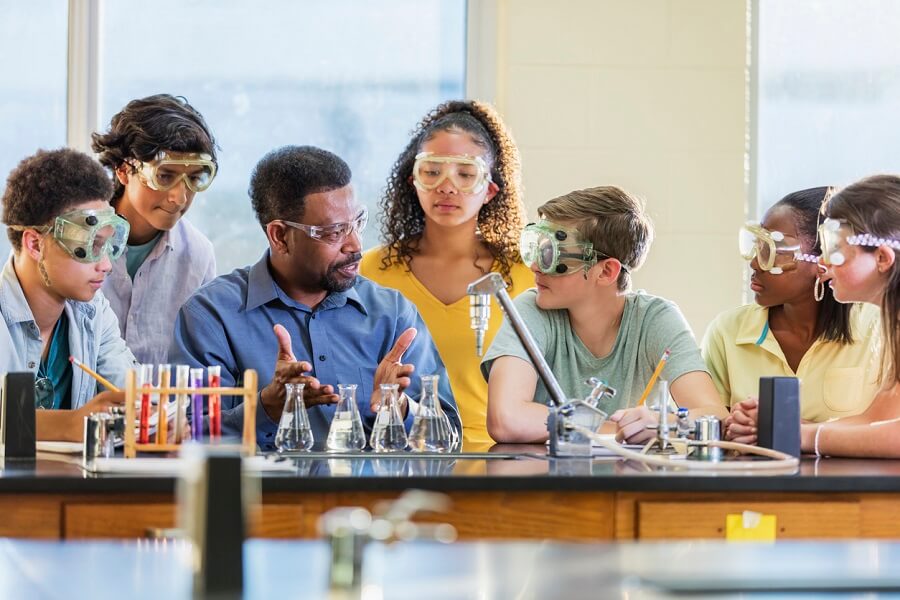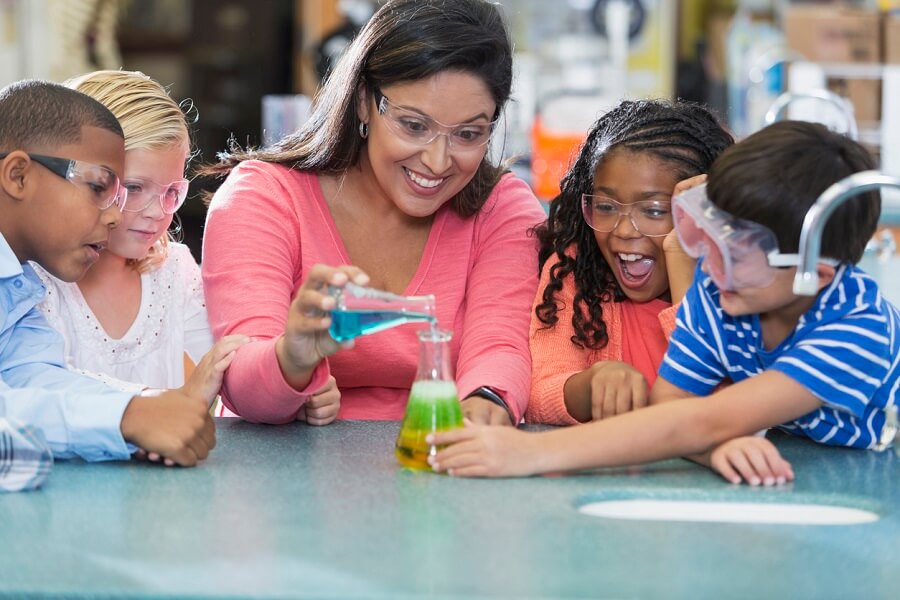Science Teacher Professional Development Guide for 2023
Professional development programs for science teachers are essential to maintaining high-quality teaching in the classroom. It enables science teachers to keep up with their continuously evolving subject while gaining new educational skills and techniques to bring to the classroom.
With a growing global focus on innovation and development, students must develop comprehensive knowledge and skills across the scientific disciplines. Almost every field is seeking new hires with science, technology, engineering, and mathematics (STEM) skills.
Thus, high-quality science instruction is instrumental in laying the groundwork for students’ educational goals and achieving life-long success in their future careers.
Our science teacher professional development guide will delve into the benefits of these programs for educators and their learners.
Why Professional Development for Science Teachers Matter
Professional development programs for science teachers allow educators to stay up-to-date with the latest information in their subject, freshen up their classroom skills, and stay current with the curriculum.

Science education in the United States has gone through a transformation, bringing new improvements to the classroom, adding relevance to students’ lives, integrating it with other subjects, and prioritizing application over memorization.
These improvements are being driven by the Next Generation of Science Standards (NGSS), which emphasizes three dimensions of learning:
- Crosscutting concepts: Showing students the connections between sciences (physical, life, earth, and space) and engineering design with an emphasis on “cause and effect.”
- Science and engineering practices: Showing what scientists do in their careers while investigating the natural world and what is involved when engineers design and build.
- Disciplinary core ideas: The primary ideas and concepts that stretch across all sciences and engineering. These can be built upon as students advance in their education.
NGSS has brought monumental change to how science is taught in schools since its introduction. Professional development for science teachers ensures educators can implement the new standards, using new tools and instructional material to support student learning as science advances.
In short, professional development programs for science teachers enable high-quality success in the classroom so teachers can lead their students to their goals.
Qualities of a Science Teacher
Excellence in science teachers varies from professional to professional. However, all successful educators in science share specific qualities. Focusing on these areas will help any science teacher excel.
Foster Scientific Literacy
Fostering scientific literacy requires understanding scientific concepts, processes, and phenomena beyond memorizing facts and theories. It requires the knowledge of how to apply the science in real-life scenarios.
Science teachers cannot teach to the test. Educators are now required to show learners how the fundamentals of the subject can be applied to our natural world and equip the students to explore beyond the classroom.
Educators develop scientific literacy in their learners by creating lesson plans that utilize relevant global issues, such as climate change, and locally, such as the development of a new dam. These tangible, real-life examples illustrate the scientific teachings in action.
Inspire Scientific Thinking
We rely on science to make sense of the world by gathering information and making inferences. But without scientific thinking, our conclusions may lack accuracy.
Scientific thinking is a process that strives to gain knowledge through a logic-based system of observation, investigation, and testing. By using a systematic process, the information gleaned is meaningful to science.
Excellent science teachers inspire students to develop skills to apply scientific thinking to understanding our world and universe.
When learners are equipped with the logic-based system of discovery, they can approach questions about their everyday world, such as why the sky sometimes displays rainbows or where steam goes after it rises from a boiling pot, and find answers beyond repeating facts.
Instead, students with scientific thinking gain real knowledge and understanding of the process behind the “answer,” making the information usable beyond answering a question on a test.
Generate Curiosity
Children are naturally curious. Quality science teachers cultivate and direct that curiosity to effectively teach the subject rather than using traditional, lecture-based instructional methods.
Fostering curiosity in learners enables them to seek answers to their questions independently, without needing the answers spoon-fed to them by their teachers. Instead, educators position themselves as guides, leading students on how to gather information, such as when delivering a laboratory experience, so students can test their theories and analyze and discuss their results.
Apply Interdisciplinary Approach
Science and engineering do not exist in a vacuum. Success in STEM careers requires interdisciplinary skills. Consequently, NGSS standards are requiring an interdisciplinary approach in the science classrooms.
Top science teachers integrate other skills into their lesson plans, including:
- Reading comprehension
- Math
- Researching historical figures in science and engineering, discoveries, and events
- Illustration
- Writing
- Presentation
- Multi-media and online tools



Science Professional Development
Schools must prioritize time and resources for science teacher professional development. Equipping educators with fresh skills, strategies, and techniques to meet the NGSS standards will foster a love of science in their students.
The benefits of science teachers being able to inspire learners to embrace an interdisciplinary scientific process extend beyond the classroom. The positive impact will be reflected in learners’ futures and the society they live in, bringing excellence to the school district.
Teachers have busy and hectic lives. Thus, they thrive in professional development programs for science teachers that are flexible, personalized, and focused on the standards-aligned curriculum.
The support, encouragement, skills, knowledge, and tools obtained from professional development programs enable science teachers to meet the following expectations:
- Up-to-date science knowledge and skills
- Self-critical examination of strengths and weaknesses
- Fosters responsibility for improving their teaching
- Opens accepting and growing from advice and feedback from their colleagues
- Understanding of how students learn science
- Knowledge of the science curriculum areas
- Understanding how to assess science in regards to the curriculum areas
Sustaining Professional Development in Science Education
As with all educators, professional development for science teachers is an ongoing process. We never stop learning and striving to achieve. New skills, techniques, and tools are always becoming available that can enhance teaching, which benefits students.
But science teachers lead their students to success on their own. Teachers require support from their school district, and administrators must make resources available for STEM educators to develop professionally. Ongoing support comes from giving these valuable teachers time, funding, and access to necessary materials and opportunities.
Children are not raised alone. Their futures are shaped by many influences, making it essential that schools see themselves in partnership with parents, the community, scientists, university faculty, and informal science organizations.
We at Simple K12 understand the need to work together. In partnership, we all thrive.
We look forward to being a part of the professional development of science teachers. Together, we can empower our science teachers to ignite a love of discovery in STEM and obtain crucial skills to keep our society flourishing.
Categories
Latest posts
Sign up for our newsletter


